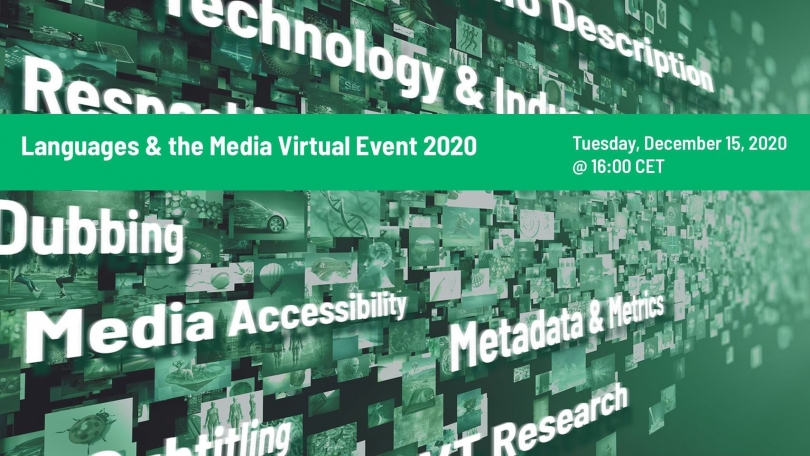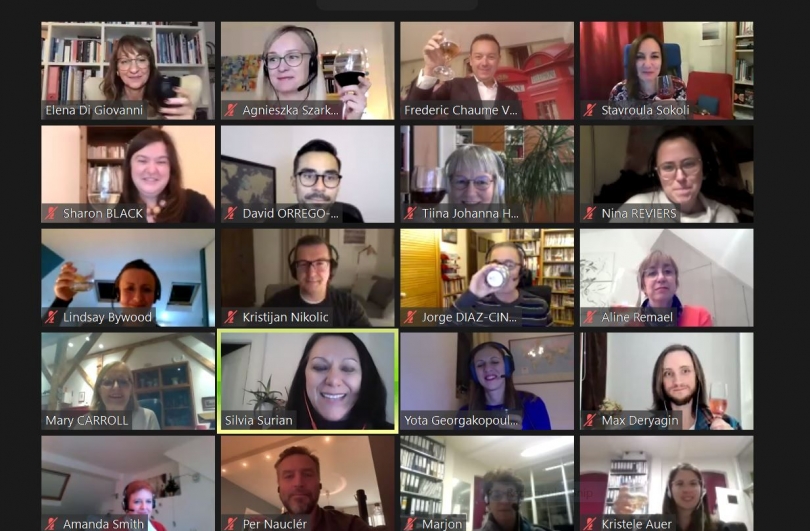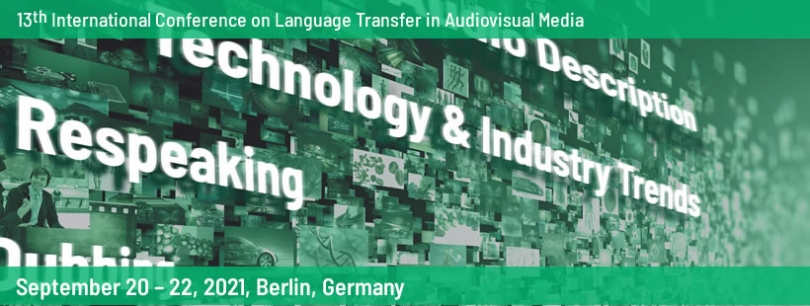
When the 13th Languages & the Media conference, Europe’s most prominent get-together on audiovisual media localisation and accessibility, was moved to 20 – 22 September 2021 due to the COVID-19 pandemic, the organisers decided to offer a silver lining to the many registrants and host the first ever Languages & the Media Virtual Event on December 15, 2020.
The almost three-hour long online event, which was attended by over 200 participants from 38 countries, opened with a very topical and thought-provoking keynote by renowned scholar Dr. Agnieszka Szarkowska from the University of Warsaw. In her talk, she looked back on the most interesting developments the world of AVT has seen in 2020, from the pre-pandemic ground-breaking Oscar win of Korean film “Parasite” to the boom in TV viewing and online streaming, from the surge in remote dubbing to the gaps in access services, and the challenges of online teaching and new technologies.
“The global lockdowns have made millions of people turn to streaming services for entertainment and linear broadcasters for information. We all became glued to the screens more than ever. But the pandemic has brought to the fore some pre-existing inequalities in access to audiovisual media and demonstrated the need to mainstream accessibility more than ever. It’s crucial for the AVT community to lobby for change in public policy and promote good practices of inclusion,” Dr. Szarkowska told the audience referring in particular to the lack of uniformity in the provision of sign-language interpreting when broadcasting critical information to the public during a global health crisis.
The opening keynote was followed by an industry roundtable featuring Allison Smith, Head of Globalisation Strategy and Innovation at Netflix; Amanda Smith, Director of Language Strategy & Content Business Operations at Discovery Communications; Gion Linder, Head of Access Services at Swiss Txt and Chair of the EBU Access Group; Max Deryagin, freelance subtitler and secretary of the British Subtitlers’ Association; and Pelle Naucler, founder and Head of Business Development of Swedish LSP Plint. The discussion was moderated by Dr. Lindsay Bywood from the University of Westminster and Dr. Kristijan Nikolic from the University of Zagreb who started off with a question on the impact of COVID-19 on the industry and the disruptive challenges posed by the pandemic.
“It’s been a roller-coaster year, to say the least,” said Pelle Naucler, “but an exciting one as well because the status quo is shifting slightly and things that were ‘nice to have’ have become ‘need to have’”. He referred in particular to the acceleration in digitisation, workflow automation and implementation of technology. This was confirmed by a poll asking participants how they felt about 2020 from a business perspective where 57% said it had been a “challenging year”. However, 33% selected “reinventing the industry”, 25% exciting prospects”, 24% said they were “drowning in work”, while only 1% claimed they had had “a horrible year”.
Of course, technology was another key conversation topic with a particular focus on the growing deployment of MT and AI in media localisation. Naucler added, “Both subtitling and dubbing will be heavily affected by AI and MT in the coming five to ten years because the amount of content being produced is staggering and a lot of that content will not be localised with human effort only. MT will be a great tool. It will assist, but also bring changes to how we work. We need to deploy it sensibly and make sure that the outcome of whomever is involved in this is better tomorrow than it is today, because the linguists that do the localisation are the main driver behind the entire industry.”
The importance of deploying MT technology sensibly was also stressed by Allison Smith. “At Netflix we are doing research into lots of different technology but always with a very critical eye to make sure we are helping, not harming the experience in any way for the translators. We determine how valuable it is and what the right approach is to use it, to make sure that we are really moving the bar up and forward in helping everyone produce those high-quality assets that provide the most value to the audience.” Max Deryagin, who represented subtitlers and freelance associations at the roundtable, described Netflix’s approach to MT as “the ethical one and something we can get behind.” He said that many experienced subtitlers are leaving the profession with rates and working conditions on a downward trend, and with “MT turning a creative job into something mechanistic and joyless.” He added that he had “even heard some companies referring to post-editors as ‘operators’, ” and continued, “We all realise and understand that MT technology is here to stay, but we also think that right now it’s not at the level where it’s really useful to us subtitlers. We need to step up to the plate to improve working conditions, relax the turnaround times, however difficult it may be, improve the rates and the ecosystem to make people happy. A happy subtitler is the one that will give you the best quality and will stay long term.”
The panel also addressed the increased focus on media accessibility that emerged during the pandemic. Gion Linder said, “People in charge at public broadcasters are now aware that accessibility is one of their USPs and we should expect more political will to mandate accessibility. We need to make sure that access services are available on all channels and platforms.” The Virtual Event itself was accessible for hearing-impaired audiences through English subtitles provided by the captioning sponsor Red Bee Media. The panellists also weighed in on the rise of local and non-English content going global and the related issue of the so-called “talent-crunch”, especially when trying to avoid pivot translations with less common language combinations. With the industry growing at a faster pace than ever before, they considered the need to bridge the gap between academia and industry more urgent than ever.
When asked what 2021 would bring, most panellists agreed that it was very difficult to make predictions. From the perspective of content owners, Amanda Smith said, “In 2021 we’ll see more streaming launches, more day-and-date releases, and more digging into Machine Translation and AI.” The pandemic has been a game changer in many ways and Gion Linder said that more agile and flexible workflows will be a must going forward. In the world of Netflix, 2021 will see more focus on quality, setting standards and guidelines, dealing with new content language pairs to distribute content globally, and a lot more work in terms of accessibility. “We are proud of the work we’ve done in the accessibility space but are very aware of how much work is left to be done to make our programmes accessible globally,” commented Allison Smith. Pelle Naucler concluded by saying, “2021 will bring disruption in our space, even more than we have seen before. I’ve said this before, but I’ll say it again, it’s time to connect the talent with the content owners and bring some automation into play.”
After a lively round of Q&A with keynote speaker and panellists, the event was closed by the Jan Ivarsson Award Ceremony presented by the European Association for Studies in Screen Translation (ESIST). The Jan Ivarsson Award, established in 2010 and traditionally conferred at Languages & the Media in Berlin, is given to a person for her or his invaluable service to the field of AVT and media accessibility. The first awardee was Jan Ivarsson himself, a pioneer in subtitling research and author of the first ever book on the art and techniques on subtitling, Subtitling for the Media – A Handbook of an Art. The book was first published in 1992 and later rewritten together with Mary Carroll, the 2012 award winner, and published again in 1998 with the title Subtitling. Other past awardees are Prof. Jorge Díaz-Cintas (2014), Prof. Yves Gambier (2016) and Prof. Aline Remael (2018), all of whom were present at the Virtual Event.
On December 15 the prestigious prize was awarded to Prof. Frederic Chaume for his outstanding contribution to AVT and the field of dubbing in particular. In his speech he said, “Being awarded with such a nice and beautiful plaque that carries the name of Jan Ivarsson is truly a privilege. I feel honoured and very lucky to be acknowledged for my work, teaching and research. Trust me, I am not taking this for granted and will do my utmost to keep contributing towards audiovisual translation.”
The Virtual Event ended with a collective toast and the wish to continue the lively conversation and celebrations at the conference in Berlin.

After a challenging year for everyone, this opportunity to bring the community together in a shared virtual space came just at the right time and the participants’ reviews were extremely positive.
Here’s what people had to say about it:
“Most polished virtual event I've attended this year!”
“This short, lively event made me look forward to the conference in 2021 even more, after the disappointment in 2020 of not being able to travel."
“Super informative and well balanced. I’ve been to several conferences that I found rather boring and this was different.”
“I wasn’t that keen on online events and stand now to be corrected after such a lovely gathering. It was topical, interesting, engaging and very well balanced.”
“Languages and the Media is a great avenue for all involved in AVT to participate and share notes and raise issues affecting them and the AVT sector in particular.”

The 13th Languages & the Media, International Conference and Exhibition on Language Transfer in Audiovisual Media, will be held on 20 – 22 September 2021 at Radisson Blu Hotel in Berlin, Germany.
Organiser: ICWE GmbH, Leibnizstr. 32, 10625 Berlin
Contact: Tel: +49 (0)30 310 18 18-0
info@languages-media.com / http://www.languages-media.com
Follow us on:
Facebook
Linkedin
Twitter
#languagesmedia, #LAM21

 Chatelin Bruno
Chatelin Bruno 





























